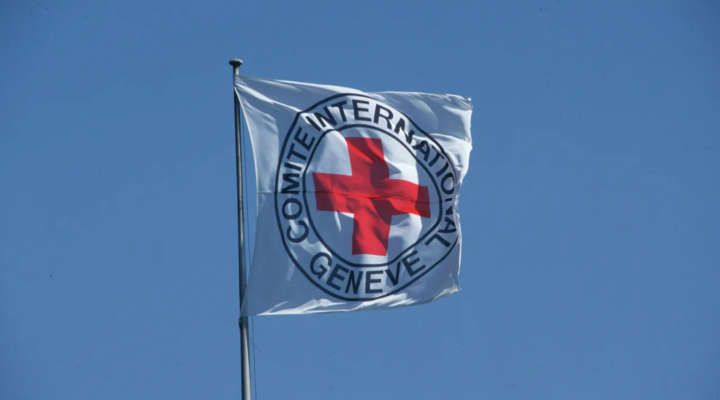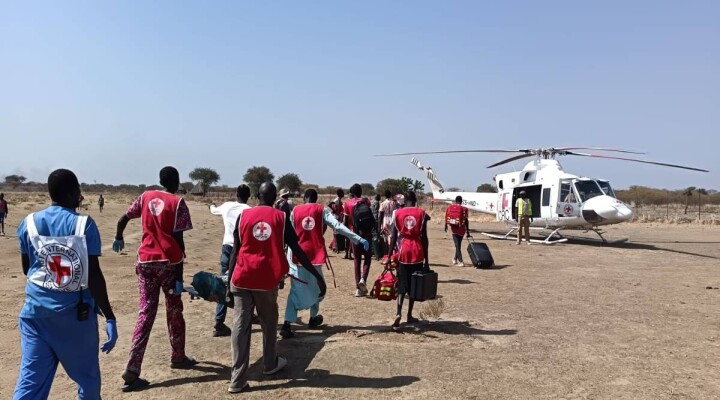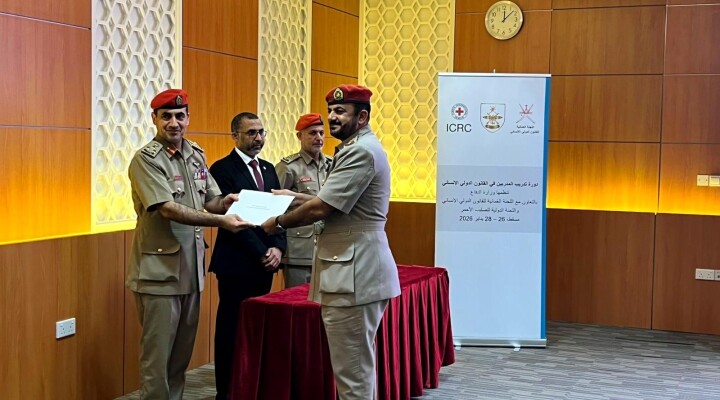Ethiopia: Hospitals under strain from conflict
“I was hit three times by bullets in my leg. I am being treated at Hayk hospital now. They told me the bullet is located way too deep and that it is hard to operate. I am just doing check-ups every week in case the bullet moves even deeper. But it is hard because it is located close to my nerves and the hospital doesn’t have the proper materials to operate as these were stolen”, explains Melaku Aragaw,a chemistry teacher in Hayk city.
Health facilities in Northern Ethiopia are under severe strain as the conflict continues for nearly a year and a half. Attacks against healthcare personnel and facilities are a major humanitarian concern, and the risk to medical personnel reduces healthcare provision for those who need it most.
“It’s very painful. Sometimes you want to cry because you think why am I coming to this hospital if I’m not to give the proper care that I should give to my patients,” said Dr. Tesfaye at Ayder Hospital, Mekele.
Strengthening humanitarian support to health facilities and improving access to health for all is a top priority for the International Committee of the Red Cross (ICRC), working closely alongside the Ethiopian Red Cross Society.
In Northern Ethiopia, especially in the Tigray, Amhara and Afar regions, the ICRC is supporting referral hospitals and general hospitals to enable them to treat weapon wounded patients and maintain essential medical services.
“We support a range of health facilities including maintaining the structures of hospital, health centers and supplying them with medicine and medical equipment that they urgently need. This support has covered 34 hospitals and more than 59 health centers so far”, explained Dr. Sally Murshed, Health Coordinator at the ICRC.
Read our operational notes on ICRC’s work in Ethiopia
Third ICRC convoy of vital humanitarian assistance reaches Tigray
An International Committee of the Red Cross (ICRC) convoy of 20 trucks containing vital humanitarian assistance including food, seeds, water treatment materials and medical supplies reached Mekele on Saturday, 30 April, 2022, with the support and cooperation of the parties to the conflict.
For further information, please contact
Daniel Sidler, Public Relations Officer (English, French), ICRC Addis Ababa, +251 944 101 700
Mohamed Abdikarim, Regional Spokesperson, ICRC Nairobi, +254 770 171 756
SHOTLIST
Location: Amhara and Tigray Region, Ethiopia
Length: 8.05
Camera: Eric Chege and Fatima Sator
Editor: Eric Chege
Filming: 23 - 25 March 2022
Copyright: ICRC access all
On Screen Credit: ICRC written or logo
On Screen Credit: ICRC or logo
00:00 – 00:12
Various exterior shots of Hayk primary hospital in Northern Amhara region.
00:13 – 00:36
Various shots of the damage at Hayk primary hospital in Northern Amhara region
00:37 - 00:46
Shots of walls riddled with bullet holes at Hayk primary hospital
00:47 – 01:20
Soundbite: Dr. Endris Hussein – Medical Director, Hayk Primary Hospital
“Health centers and hospitals are destroyed. People who were suffering from associated pain and people that used to come to our hospital for a follow up died because they couldn’t get medicine. Mothers gave birth to their children at home and most of them suffered and lost their lives because they couldn’t get proper medical care. Patients who had asthma, diabetes, blood pressure died in their homes. The populace was in a very severe health crisis here.”
01:21 – 01:45
Various shots of patients at Hayk primary hospital
01:46 – 02:20
Soundbite: Melaku Aragaw – Teacher, Hayk Town, Northern Amhara Region
“I was hit three times by bullets in my leg. I am being treated at Hayk hospital now. They told me the bullet is located way too deep and that it is hard to operate. I am just doing check-ups every week in case the bullet moves even deeper. But it is hard because it is located close to my nerves and the hospital doesn’t have the proper materials to operate as these were stolen.”
02:21 – 02:34
Exterior shots of Mekelle General Hospital in Tigray region.
02:35 – 02:53
Various shots of patients waiting to be attended to at Mekelle General Hospital in Tigray region.
02:54 – 03:06
Various shots of patients admitted at Mekelle General Hospital in Tigray region
03:07 – 03:46
Soundbite: Dr. Tesfaye – Mekelle Hospital, Tigray Region
“We don’t have MRI machines, CT scans and Dialysis machines. We also don’t have medicine such as insulin, so patients who need such medicine will go untreated and they might also die. We’ve seen patients who are dying because we are not giving them the proper care that they need. It’s very painful. Sometimes you want to cry because you think why Am I coming to this hospital if I’m not to give the proper care that I should give to my patients.”
03:47 – 03:58
Exterior shots of Ayder hospital in Tigray region.
03:59 – 04:10
Various shots of patients lining up to be registered at Ayder hospital in Tigray region.
04:11 – 04:28
Various shots of patients waiting to be attended to at Ayder hospital.
04:29 – 05:30
Soundbite: Seyoum Teka – Patient, Ayder Hospital, Tigray Region
“I am supposed to get an operation before I receive medication. The doctors from this unit were going to collaborate with another unit to do the operation but since there is a shortage of doctors, they are unable to perform the surgery. Everything is closed, if it was open, then the doctors might have had a chance to work with other specialists to help my case, but that’s not an option so they are just sitting around.”
05:31 – 05:41
Exterior shots of Woldie specialized hospital in Northern Amhara region.
05:42 – 06:08
Various shots of a patient being attended to at Woldie specialized hospital in Northern Amhara region.
06:09 – 06:50
Soundbite: Dr. Sally Murshed – Health Coordinator, ICRC
“The ICRC team implemented several health assessments in the area of conflict north of the country, which included Afar, Tigray and Amhara to identify the actual needs of the health system. We designed our response according to the findings of our assessment. We supported several health facilities including maintaining the structures of hospital, health centers and supplying them with medicine and medical equipment that they are in need for. This covered 34 hospitals and more than 59 health centers.”
06:51 – 07:06
Various shots of ICRC transporting medical supplies to Tigray region by air.
07:07 – 07:19
Shots of an ICRC convoy of trucks transporting medical supplies in Tigray region.
07:20 – 08:05
Soundbite: Dr. Sally Murshed – Health Coordinator, ICRC
“As a forward, the ICRC is planning for the coming period to support more health facilities across the conflict areas and to respond more to their actual needs through regular support to hospitals and health centers by sending supplies quarterly of medicine and medical equipment. We also want to focus on building the capacity of health personnel across the area of conflict. We will focus more on our partnership with the National Society to implement and improve ambulance and pre-hospital services.



